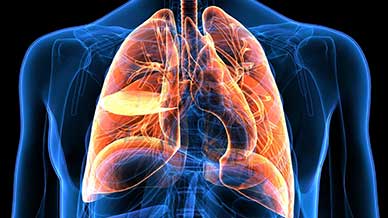Many people struggle with respiratory concerns as they age. New research on resveratrol lung benefits suggests that this compound found in red wine may help protect the lungs against premature aging and disease.
Respiratory concerns are some of the most serious causes of death on the globe, killing around three million people a year and affecting many times more. These include common health problems such as asthma, chronic obstructive pulmonary disease (COPD) and lung cancer. These conditions are especially common and more serious in children and the elderly. While there are treatments that can reduce symptoms, there are currently no cures for most serious lung problems. However, several recent studies on resveratrol lung benefits suggest that a simple natural remedy may be able to help many.
What Is Resveratrol?
 Resveratrol has recently become popular due to its many reported health benefits. Naturally produced in the skins of grapes as well as being present in peanuts and pistachios, this antioxidant is the result of plants’ exposure to stressors such as drought, ultraviolet light and fungal infections. Besides protecting plants from external stressors, it appears to act as an antioxidant in the human body as well. Recent studies have found that resveratrol may have cardiovascular benefits, help maintain healthy cell growth and function and even promote healthy aging. According to new studies, it may also promote healthy aging in the lungs and help to protect against respiratory concerns.
Resveratrol has recently become popular due to its many reported health benefits. Naturally produced in the skins of grapes as well as being present in peanuts and pistachios, this antioxidant is the result of plants’ exposure to stressors such as drought, ultraviolet light and fungal infections. Besides protecting plants from external stressors, it appears to act as an antioxidant in the human body as well. Recent studies have found that resveratrol may have cardiovascular benefits, help maintain healthy cell growth and function and even promote healthy aging. According to new studies, it may also promote healthy aging in the lungs and help to protect against respiratory concerns.
Lungs and the Aging Process
We may not notice deterioration in our respiratory tracts the way we notice new wrinkles or a change in vision, but our lungs indeed change as we age. Our alveoli become enlarged and less elastic, making them less able to exchange gases. In addition, the tissues that make up the lungs deteriorate and lose functionality over time. As lungs lose the ability to breathe effectively, cells become inflamed, which causes even more damage. The result is a gradual loss of function and the eventual onset of diseases such as COPD and emphysema.
Age-related lung concerns take a huge toll on people who suffer from them and on the nation as a whole. They can make it difficult for people to work, exercise or even to perform simple tasks such as walking to the mailbox. These are very expensive conditions, with COPD alone costing $36 million a year just in health costs. Preventing or even slowing the progression of lung concerns can lead to higher quality of life, fewer deaths and nationwide economic savings.
Resveratrol Lung Benefits
 How can a simple grape extract help promote healthy respiratory aging and protect against certain lung concerns? The antioxidant effects of resveratrol are believed to be one of its major benefits. In one study, when mice were given inhaled resveratrol, they saw less of the alveolar changes that underlie aging in the lungs. They experienced less lung cell damage, fewer DNA mutations and better lung function. These resveratrol lung benefits were measurable after just three months of the treatment.
How can a simple grape extract help promote healthy respiratory aging and protect against certain lung concerns? The antioxidant effects of resveratrol are believed to be one of its major benefits. In one study, when mice were given inhaled resveratrol, they saw less of the alveolar changes that underlie aging in the lungs. They experienced less lung cell damage, fewer DNA mutations and better lung function. These resveratrol lung benefits were measurable after just three months of the treatment.
In addition, resveratrol appears to promote healthy cellular inflammatory processes and have an effect on inflammation that causes the progression of respiratory illnesses such as COPD. When COPD patients are given resveratrol, they show lower cytokine levels in their lung fluids. This is significant because cytokines released by lung macrophages produce much of the inflammation associated with respiratory disease. People also had a more than 50 percent reduction in other known mediators of inflammation.
Resveratrol, Curcumin and Lung Cancer
Do resveratrol lung benefits extend to deadly diseases such as lung cancer? A recent study suggests that this plant antioxidant may at least be beneficial—likely by promoting healthy DNA—which is sometimes responsible for the uncontrolled growth of unhealthy cells. This effect is especially strong when resveratrol is combined with curcumin, a compound found in spices such as cumin. These two natural remedies appear to act synergistically, with far more benefit when used together than when either is used alone.
Natural Remedies for Lifelong Health
While pharmaceuticals will always be necessary for many people with respiratory concerns, these studies suggest that others may be able to derive some relief with natural remedies such as resveratrol. In fact, resveratrol is believed to be responsible for many of the purported health benefits of red wine, which contains high levels of this antioxidant. In many ways, natural remedies can be superior when it comes to keeping people healthy. As the old saying goes, “Prevention is the best cure.”
There is still a great deal of research to be done on resveratrol lung benefits. However, these studies add to a growing body of evidence suggesting that this plant compound may have a positive effect on whole-body health by promoting healthy cellular inflammatory processes and protecting against tissue damage. A glass of wine, handful of grapes or resveratrol supplement just may bring you one step closer to healthy aging.
 We may not think of our
We may not think of our  Zebrafish are often used in studies regarding human health because they have similar hormones and exhibit similar behavior in response to these hormones. Recent research on these fish suggests that probiotics may be especially important for increasing positive hormones such as serotonin while reducing negative biochemicals that cause stress. In fact, zebrafish that were given probiotics in a recent study began to show not just a healthier hormonal balance, but less stress-related behaviors. Like humans, fish act differently, and in predictable ways, when they are under stress. Fish who are given supplements to encourage healthy gut fauna
Zebrafish are often used in studies regarding human health because they have similar hormones and exhibit similar behavior in response to these hormones. Recent research on these fish suggests that probiotics may be especially important for increasing positive hormones such as serotonin while reducing negative biochemicals that cause stress. In fact, zebrafish that were given probiotics in a recent study began to show not just a healthier hormonal balance, but less stress-related behaviors. Like humans, fish act differently, and in predictable ways, when they are under stress. Fish who are given supplements to encourage healthy gut fauna  Artificial light is ubiquitous in the modern world. Not only do light bulbs and other artificial lighting sources
Artificial light is ubiquitous in the modern world. Not only do light bulbs and other artificial lighting sources  People who are exposed to high levels of blue light on a regular basis are more likely to suffer from a variety of vision problems. You have probably noticed that you suffer from eye strain after reading from a screen for an extended period of time. However, this is just the beginning. High exposure to blue light has also been found in
People who are exposed to high levels of blue light on a regular basis are more likely to suffer from a variety of vision problems. You have probably noticed that you suffer from eye strain after reading from a screen for an extended period of time. However, this is just the beginning. High exposure to blue light has also been found in  Melatonin may be a potential treatment for helping to soothe anxiety, especially anxiety that comes with occasional difficulty falling asleep and other sleep concerns. Melatonin has long been noted to decrease anxious behaviors in research animals, even as far back as 1984. Researchers noted that animals who had higher levels of melatonin showed
Melatonin may be a potential treatment for helping to soothe anxiety, especially anxiety that comes with occasional difficulty falling asleep and other sleep concerns. Melatonin has long been noted to decrease anxious behaviors in research animals, even as far back as 1984. Researchers noted that animals who had higher levels of melatonin showed  One of the most significant causes of death worldwide is acute respiratory illness. Even healthy people may fall critically ill from these infections, leaving them temporarily or permanently disabled and even threatening their lives. New research suggests that
One of the most significant causes of death worldwide is acute respiratory illness. Even healthy people may fall critically ill from these infections, leaving them temporarily or permanently disabled and even threatening their lives. New research suggests that  Probiotics are the friendly bacteria that colonize healthy digestive tracts and help our bowels work smoothly. However, these bacteria do not live independently in a “bubble.” Like all living creatures, they need food to live. This food is present in natural, more plant-based diets but may not be present in adequate quantities in the typical Western diet.
Probiotics are the friendly bacteria that colonize healthy digestive tracts and help our bowels work smoothly. However, these bacteria do not live independently in a “bubble.” Like all living creatures, they need food to live. This food is present in natural, more plant-based diets but may not be present in adequate quantities in the typical Western diet.